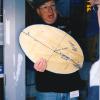Requiem for a Sextant
Recently I learned that the Naval Academy no longer requires Midshipmen to learn how to navigate with a sextant. Now this venerable tool joins slide rules, chronographs, orreries, astrolabes and many other instruments in technical obsolescence. We no longer need the sextant. Inexpensive hand-held civilian Global Satellite Positioning trackers are accurate to within feet. Military GPS equipment can locate a vessel anywhere on the Earth to within an inch or two. With the sextant's exit, we no longer need star tables or a knowledge of spherical trigonometry. GPS accuracy would have been the envy of James Cook or Ferdnando Magellan. Without doubt, the modern tools are superior in countless ways to their predecessors. However, you need not be some modern day Ned Ludd to recognize how much automated tools isolate us from the natural world.Adults can be just as unaware of the natural world as children. Adults have asked me if the planets that they view through my telescope are "real". Somehow, the fact that a few pieces of curved glass can display a celestial body now seems miraculous. Some people do not realize that most planets are easily seen with an unaided eye. We have become so divorced from the natural world that simple tools no longer seem adequate to do the jobs they have done for centuries. Imagine! You need not download pictures from the Hubble Space Telescope over the Internet to actually see details on Jupiter!While the old tools may seem difficult and crude by today's standards, they have one overwhelming advantage. They force you to look at the real world before they are the least bit useful. A sextant measures the angle between a celestial object and the horizon. Given that angle, and a book of star tables, and a knowledge of some spherical trigonometry allows navigators to steer their vessels anywhere on the globe. However, the sextant, the mathematical tables and trigonometry are totally and absolutely useless if the navigator doesn't know at which star or planet he or she is looking. Navigators have a sense of connection to the real world that users of GPS gadgets lack.On a summer's night, after the heat and bustle of the day has passed, there is nothing more relaxing than gazing long and thoughtfully at the sky. The Milky Way is the most spectacular galaxy we can see with or without telescopes. The planets come and go, constantly changing their position week after week. If you wait almost any night for an hour or two you will catch a glimpse of a meteor streaking across the sky. Who knows? You might even see a GPS satellite whizzing about the globe as it lets sailors (and hikers, and car drivers and anyone else) navigate their ways about the Earth. Whatever you see, you'll be rewarded by your experience in a way which no digital gadget provides. You will reaffirm your bond to the natural world.This year, the natural world has much to see in the Summer months between sunset (near 9:00) and sunrise (near 6:45). Neptune and Uranus are rising in Capricornus as the Sun sets. About two hours later Jupiter rises in the constellation Pisces. Saturn, in Aries, rises about a half hour after midnight. Mars and Venus rises together about five in the morning centered in the constellation Gemini. Mercury rises and sets with the Sun at this time of the year.The Summer sky has two of the celestial heroes Hercules and Ophiuchus battling a giant snake. Today we count the snake as two constellations: Serpens Caput (snake's head) and Serpens Cauda (snake's tail). Look for Hercules directly overhead when the sky gets dark. Ophiuchus and Serpens are just to the south of Hercules. Serpens must be terrible indeed if it takes two of the sky's mightiest heroes (where Hercules is armed with a club) to subdue the monster! See if you can pick out this titanic struggle. Oh, by the way, faint little Pluto is in the constellation Ophiuchus. Perhaps Pluto is trying to get a ring side seat to the battle.
- Author:
- Leslie Coleman
- Entry Date:
- Jul 1, 1998
- Published Under:
- Leslie Coleman's Columns


